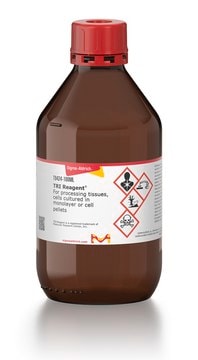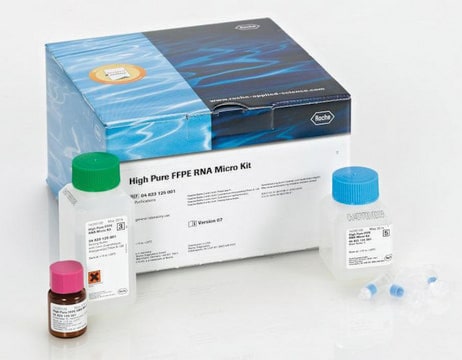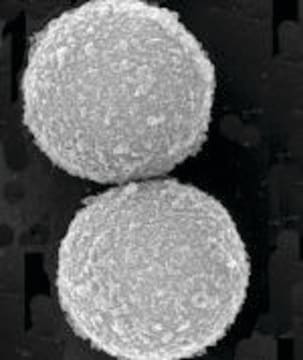12033674001
Roche
High Pure RNA Tissue Kit
sufficient for 50 isolation(s), suitable for RT-PCR, suitable for Northern blotting
Synonym(s):
RNA purification
About This Item
Recommended Products
usage
sufficient for 50 isolation(s)
Quality Level
manufacturer/tradename
Roche
packaging
kit of for 50 isolations
technique(s)
Northern blotting: suitable
RT-PCR: suitable
General description
Capacity: The High Pure Spin Filter Tubes hold up to 700 μL sample volume.
Sample Material: Solid tissue (e.g., mouse liver, spleen, lung, heart): 1 - 25 mg.
Note: Sample size depends on the method used to prepare the tissue; larger samples (>10 mg) should be processed via rotor-stator homogenization.
Application
- to extract total RNA from human cells for cDNA library generation
- to extract total RNA from cultured cells for real time PCR analysis
- to extract total RNAs from rat hippocampi
- to purify total RNA from cultured cells and human spinal cord
- to isolate total RNA of tissues collected from ventricle walls
The isolated RNA can be used in many downstream applications:,
- Northern blotting
- RACE
- primer extension
- differential display
- RNase protection assay
- in vitro translation
Features and Benefits
- Prepare RNA samples in approximately 30 minutes.
- Obtain concentrated RNA that is suitable for downstream applications.
- Minimize RNA loss with a kit that removes contaminants without precipitation or other handling steps that degrade RNA.
- Eliminate the use of hazardous organic compounds such as cesium chloride, phenol, chloroform, and ethidium bromide.
Components
- Lysis/Binding Buffer
- DNase I, lyophilizate
- DNase Incubation Buffer
- Wash Buffer I
- Wash Buffer II
- Elution Buffer
- High Pure Spin Filter Tubes (containing glass fiber fleece)
- Collection Tubes
Quality
- Tissue is disrupted and homogenized in Lysis/Binding Buffer and purified as described.
- RNA yield is determined by measuring the optical density at 260 nm.
- Integrity and size distribution are examined by the banding pattern of ribosomal RNA in a denaturing agarose gel.
- 10 μL of the RNA eluate is used in first strand synthesis with reverse transcriptase M-MuLV and p(dT)15 as primer. In the following PCR, accomplished using the Expand High Fidelity PCR System and specific primers for glycerinaldehyde 3-phosphate dehydrogenase (GAPDH), the expected amplification product of 983 bp is obtained.
- Absence of contaminating DNA is examined by a PCR without a preceding RT reaction; no amplification product is obtained.
Preparation Note
Other Notes
For life science research only. Not for use in diagnostic procedures.
Lane 1: Homogenization: Ultra Turrax; yield: 1.9 μg/mg tissue; A 260/ A 280 : 2.0
Lane 2: Homogenization: motor-driven, disposable plastic pestle; yield: 3 μg/mg tissue; A 260 /A 280 : 2.0
Lane 3: Homogenization: mortar and pestle, 20 G needle; yield: 1.5 μg/mg tissue; A 260 /A 280 : 2.0
Lane 4: Homogenization: manual disposable plastic pestle, 20 G needle; yield: 1.8 μg/mg tissue; A 260 /A 280 : 2.0
Lane 5: Homogenization: manual disposable plastic pestle; yield: 3.4 μg/mg tissue; A 260 /A 280 : 2.0
Lane 6: Homogenization: bead-vortex; yield: 3 μg/mg tissue; A 260 /A 280 : 2.0
Lane 7: Molecular weight marker
Signal Word
Danger
Hazard Statements
Precautionary Statements
Hazard Classifications
Acute Tox. 4 - Acute Tox. 4 Oral - Eye Irrit. 2 - Resp. Sens. 1 - Skin Irrit. 2 Inhalation - Skin Sens. 1
Storage Class Code
12 - Non Combustible Liquids
WGK
WGK 1
Flash Point(F)
does not flash
Flash Point(C)
does not flash
Certificates of Analysis (COA)
Search for Certificates of Analysis (COA) by entering the products Lot/Batch Number. Lot and Batch Numbers can be found on a product’s label following the words ‘Lot’ or ‘Batch’.
Already Own This Product?
Find documentation for the products that you have recently purchased in the Document Library.
Customers Also Viewed
Our team of scientists has experience in all areas of research including Life Science, Material Science, Chemical Synthesis, Chromatography, Analytical and many others.
Contact Technical Service









